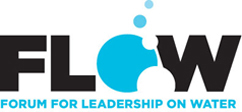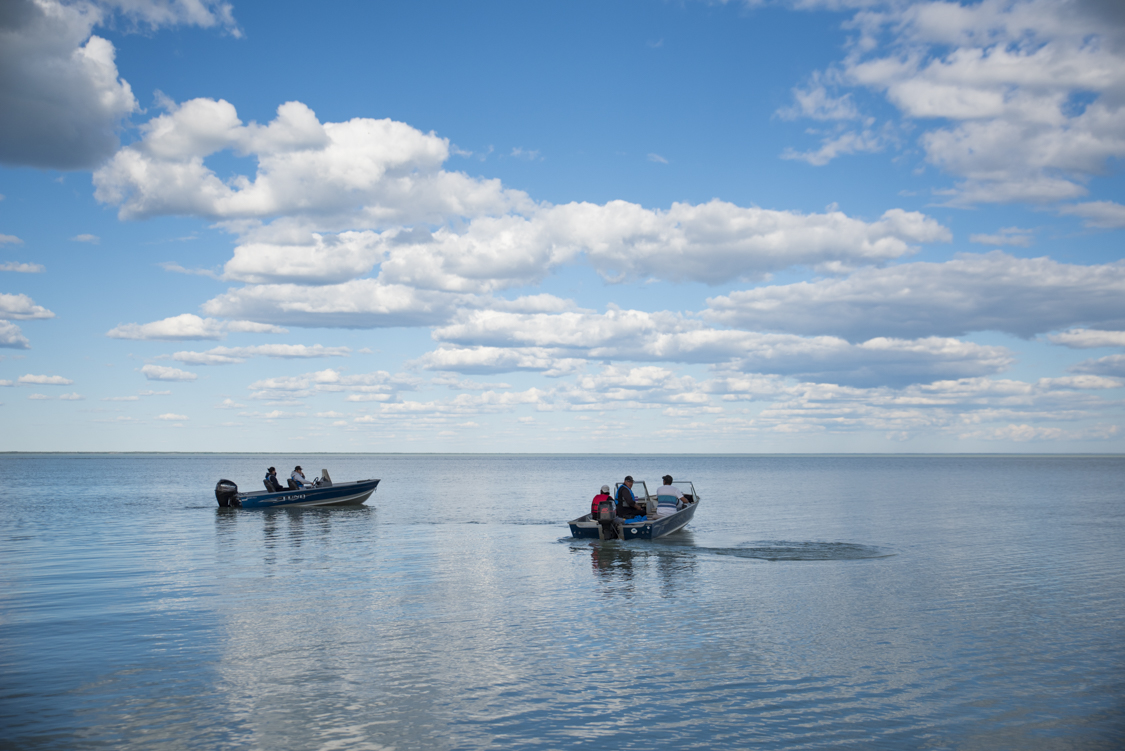 The Forum for Leadership on Water (FLOW) is an independent think tank focused on water policy issues in Canada. Formed a decade ago, FLOW joined Tides Canada’s shared platform in 2016. FLOW convenes leading thinkers, provides critical analysis and commentary, and engages with governments to advance public policies and inform important decisions about the future of Canada freshwater resources and ecosystems.
The Forum for Leadership on Water (FLOW) is an independent think tank focused on water policy issues in Canada. Formed a decade ago, FLOW joined Tides Canada’s shared platform in 2016. FLOW convenes leading thinkers, provides critical analysis and commentary, and engages with governments to advance public policies and inform important decisions about the future of Canada freshwater resources and ecosystems.
Over the past few years, the focus of FLOW’s work has been at the federal government level. In particular on the current government’s efforts to reform the Fisheries and Navigation Protection Acts, how federal infrastructure investments can be leveraged to advance sustainable urban water management, and Canada’s role in achieving global water security.
We interviewed FLOW Project Director Tony Maas to learn more about the project, its work on public policy, and his participation on a recent trip south to learn about water management in the US.

What is your role with FLOW and why did you get involved?
I currently serve as the Director of FLOW. As the initiative’s sole staff person (the others are volunteer members), I am responsible for managing the strategic vision and planning, fundraising, policy research and reports, government relations, and external communications.
I began working with FLOW’s predecessor, the Gordon Water Group of Concerned Scientists and Citizens, as a volunteer member when I was with WWF Canada. We came together in 2007 to publish Changing the Flow: A Blueprint for Federal Action on Freshwater – a project coordinated by the Sierra Club of Canada. Following the launch of the Blueprint, the group identified a need for ongoing, independent analysis and perspective on water policy in Canada. I became involved because the project and ultimately the initiative presented an opportunity to work with and learn from a pretty elite group of water policy experts with vast experience.
How does FLOW work to achieve its goal?
FLOW does two main things to inform water policy in Canada:
- We engage around policy priorities of governments. A key example is the current federal government’s renewal of the Fisheries Act – one of the most important laws in Canada for freshwater protection and restoration. For the past three years, I have helped to coordinate a group of over 20 environmental and conservation organizations from across Canada, developed policy proposals based on input from those groups, built common ground with industry and Indigenous groups, and engaged directly in the government’s legislative process.
- We also look forward—proposing new opportunities for government to strengthen public polices related to the protection and restoration of freshwater resources and ecosystems. We are currently working in partnership with academic experts at the University of Saskatchewan to help translate their research into policy proposals for consideration by the federal government, and have convened a group of Indigenous and non-Indigenous water experts to explore reconciliation of Crown and Indigenous water polices. In both instances, the focus has been on the prospect of renewing the Canada Water Act—the only federal law focused exclusively on water— which has not been updated for decades.
The key to my work is the ability to leverage the expertise of the diverse FLOW membership, which includes former senior officials with federal and provincial governments, nationally and globally recognized experts on water, climate change and Indigenous governance, and leaders of research institutes and non-government organizations. We also convene other experts, and publish reports, policy briefs, and our semi-regular FLOW Monitor, which provides a synthesis of key happenings in water policy in Canada. These materials provide the basis for our engagement with government – both elected officials and government staff.
We also undertake some contract work. For example, we recently undertook a series of stakeholder consultations on the future of flood risk management on behalf of the Insurance Bureau of Canada. The outputs of the consultation served as background for a multi-stakeholder roundtable hosted by the current Federal Minister of Public Safety.
FLOW is unique in our approach and focus. We are not a public education or engagement organization – we are squarely focused on informing public policy through research, publications, convening experts, and engaging with policymakers. We are also unique in our ability to sustain this focus on priority public policies for the long haul… it can take five to 10 years to ensure laws passed by legislatures are implemented in ways that have positive impacts on the ground and in the water. Finally, we are unique in our membership: as a collective, FLOW has over 300 years of experience working on water policy.
What exciting activities are coming up for the project?
We are deep in the final stages of the federal government’s renewal of the Fisheries Act. A core element of the current federal government’s mandate, the legislation (Bill C-68) to reform the Act is currently being debated in the Senate and will soon be referred to the Senate Standing Committee on Fisheries and Oceans. As such, we are working with the previously mentioned group of environmental and conservation groups to inform this important phase of the legislative process. Our hope is to see a renewed Fisheries Act in place by spring of 2019 – at which point attention will turn attention to informing the development of regulations and policies to implement the law.
As noted above, we are also exploring the potential to position the renewal of the Canada Water Act as a policy priority for the next federal government. We believe there is a significant opportunity to dramatically improve water management in Canada by leveraging world-class science from Canadian academic institutions, advancing reconciliation with Indigenous peoples, and strengthening cooperative federalism.
What are you most proud of with FLOW?
I am most proud of our current work on the Fisheries Act because it demonstrates clearly the constructive role that non-governmental organizations can play in informing public policy. While the process is not yet complete, I firmly believe that renewal of this important federal law, and the polices and regulations that will be developed to implement it, will have tangible benefits for the health and sustainability of freshwater resources and ecosystems across the country for decades to come. And I believe that FLOW has played a unique and important role in making that happen.
Many water experts note how important it is to consider the interconnectedness of our waters and coordinating efforts across borders to achieve impact. You were recently invited as part of an international contingent to take part in an exciting three-week tour to learn more about US water resource management. Can you share more about it?
I was invited by the US Consul General in Toronto and the US Ambassador to Canada to join a select group of 18 experts from around the world to participate in an International Visitor Leadership Program (ILVP), the State Department’s premiere professional exchange program. The program involved three weeks of meetings, field trips, and other professional activities focused on Water Resources Management in four cities across the continental US: Washington, DC; Philadelphia; Cleveland; and, Seattle.
What was your biggest takeaway from the tour?
The thing that struck me most – and was an observation shared by many of the amazing colleagues I spent those three weeks with – is that the vast majority of the projects or programs we learned about connected back in some way the US Clean Water Act. This federal law was passed in 1972 – the same year I was born – has endured numerous presidents and administrations, and continues to form the foundation of collaborations among state and federal agencies, research institutes and local governments and non-government organizations.
Part of the power of the Clean Water Act lies in its clearly stated intent: “The objective of this Act is to restore and maintain the chemical, physical, and biological integrity of the Nation’s waters.” In lay terms, that means the goal is to ensure the health of the rivers and lakes that sustain people, fish and wildlife, communities, and livelihoods.
Was there a key takeaway you observed for Canada to improve its approach to water policy?
I think Canada needs an overarching law – and a related policy agenda – similar to that of the US Clean Water Act. We have the seeds in our federal Canada Water Act, but it is in need of renewal to: establish a concrete, actionable purpose; recognize the rights and roles of Indigenous peoples in water governance; and, establish policies and investments that mobilize Canada’s vast and diverse expertise and experience to secure the health of our waters for this and future generations.
What gave you hope from this experience?
The focus on restoring ecosystems and the resulting benefits to local communities, people, and economies. We visited the Elwha River near Port Angeles, WA, where two aging large dams have been removed, restoring not only salmon habitat but also enhancing the values of local Indigenous peoples. A tour of the rural Black River watershed near Cleveland, OH, highlighted smaller-scale creek restoration projects in an agricultural landscape.
And maybe the most impressive example of all is the ongoing effort to restore the Cuyahoga River, which empties into Lake Erie (which we share with the US) at Cleveland. The Cuyahoga became famous in the 1960s for being so polluted that it literally caught on fire – numerous times. This ultimately helped to spur the modern environmental movement in the US and North America, including the creation of the US Clean Water Act. While still a “working river” with significant heavy industry in and around the Cleveland area, the concerted and sustained efforts of federal and state agencies, local governments, and community watershed groups are demonstrating in tangible terms what it means to delver on the Clean Water Act’s objective to “restore and maintain the chemical, physical, and biological integrity” of a water body. Over the course of decades, dams that have reached the end of their useable lives have been removed, vegetation has been restored along the river’s banks, and the discharge of pollutants into its waters has been dramatically reduced. The result: better water quality, healthier fish populations, and communities that engage with the river as a vital and cherished element of communities and the broader watershed.
I also gained hope from my newfound colleagues and friends. For someone who has spent 15 years working to inform policy agendas of governments in Canada, it was incredibly reassuring and inspiring to know that there are amazing people in so many countries sharing the cause of ensuring that everyone has safe, clean waters for drinking, swimming, and fishing. I learned so much in three weeks as we travelled together – standing in long lines at airports talking about how to save lakes from massive algae blooms; moving between itinerary stops in vans and busses discussing water laws from around the planet; and sharing stories over a beer about how each others’ home waters are the reason why we do what we do. It was a truly remarkable experience and I will be forever grateful to the US State Department, the IVLP program team, and the American people that support this program with their tax dollars..
In what ways have you found being on Tides Canada’s shared platform is beneficial to your work?
By managing the bulk of the administrative, financial, and reporting functions, the shared platform and FLOW’s amazing support team allows me and the FLOW membership to focus most of our limited time and energy on what we do best – engaging in and informing public policy. We would be far less impactful in our work without the support of the shared platform.
What are the most pressing issues you hope to address in your work moving forward?
Water issues are rapidly rising on the radar of governments, business, and communities across the country around the world. Responding to increasingly common and severe flood and drought, ensuring safe drinking water for communities and reliable water supplies for business and industry, or protecting and restoring the health of rivers, lakes and wetlands – water and how society interacts with it will be one of the most significant challenges of the 21st century. I an eager to direct FLOW’s expertise and knowledge to the development of policies that focus, investments, knowledge, and innovation in three interconnected areas:
- Building resilience to adapt to water-related impacts of climate change;
- Restoring the aquatic ecosystems and the benefits they provide to society; and
- Advancing reconciliation with Indigenous peoples.
To learn more about or support FLOW, visit flowcanada.org or follow on Twitter and Facebook.
